Launching JPOD @ Philadelphia: Accelerating Health-Care Innovation at Pennovation Center

On November 1, Penn President Amy Gutmann and EVP Craig Carnaroli welcomed Johnson & Johnson executives, including William Hait, global head, external innovation, as well as Philadelphia Mayor Jim Kenney, venture capitalists, entrepreneurs and other guests to the grand opening celebration of JPOD @ Philadelphia. J&J’s new innovation accelerator hub is the first of its kind in the world and is located at Penn’s Pennovation Center. Innovation is a central pillar in President Gutmann’s Penn Compact 2020. She said we can only imagine the future breakthroughs that will come out of this partnership. The hope is “to advance knowledge for good in the world,” she said.
There were 90-second pitches from the seven new JPOD @ Philadelphia resident companies who presented on their technologies and why they are excited about being part of this collaborative ecosystem. Several of these companies have Penn connections: Some are leveraging nanotechnology developed at Penn, some have Penn faculty as advisors and others include Penn alumni.
There was also a panel discussion on the Future of HealthTech.
JPOD is a collaboration between Penn, Johnson & Johnson Innovation, and JLABS that offers resident companies and innovators training, mentoring and networking programs to equip them with a mix of resources to enable their success. JPOD @ Philadelphia will serve as a regional resource, amplifying Philadelphia’s innovation ecosystem. JPOD taps into the existing nexus of science, laboratory and entrepreneurial efforts taking place at the Pennovation Works and the region’s life sciences community to accelerate health-care innovation. The JPOD is a networking hub, which includes a secure telecommunications conferencing system to connect regional innovators to the J&J Innovation network. The goal is to identify and accelerate the development of early-stage health-care solutions from the life science ecosystem that address significant unmet patient and consumer needs in medical devices, pharmaceuticals, consumer and health technologies. The JPOD will support those innovators with training, mentoring and networking programs designed to equip them with a mix of resources.
New Penn Medicine Center: Bringing Immunotherapy Research to Brain Tumor Treatment
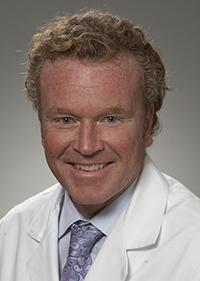
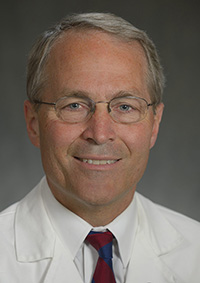 Penn Medicine announced the newest Translational Center of Excellence (TCE) in the Abramson Cancer Center, which will be focused on Glioblastoma Multiforme, the most common and lethal form of brain cancer. The team will investigate new immune therapies for glioblastoma and, in particular, design and test new CAR T cell therapies. This involves engineering patients’ T cells (the cells that act on behalf of the immune system) to attack tumor cells. The world’s first gene-based cancer therapy, immunotherapy—or CAR T cell therapy—was pioneered at Penn Medicine, and it became the nation’s first FDA-approved personalized cellular therapy for cancer in August 2017 (Almanac September 12, 2017).
Penn Medicine announced the newest Translational Center of Excellence (TCE) in the Abramson Cancer Center, which will be focused on Glioblastoma Multiforme, the most common and lethal form of brain cancer. The team will investigate new immune therapies for glioblastoma and, in particular, design and test new CAR T cell therapies. This involves engineering patients’ T cells (the cells that act on behalf of the immune system) to attack tumor cells. The world’s first gene-based cancer therapy, immunotherapy—or CAR T cell therapy—was pioneered at Penn Medicine, and it became the nation’s first FDA-approved personalized cellular therapy for cancer in August 2017 (Almanac September 12, 2017).
Roughly 15,000 people are diagnosed with glioblastoma each year, with a median survival rate of only 15 months. It has recently been in the news with regard to Senator John McCain, who died 13 months after his glioblastoma diagnosis (Almanac September 11, 2018). Penn Medicine is on the frontlines in the fight against brain tumors like glioblastoma, with the Penn Brain Tumor Center performing the most brain tumor surgeries in Pennsylvania.
“Penn Medicine is at the cutting-edge of research and clinical care for patients with glioblastoma, and our TCE will help accelerate this mission-critical work,” said Donald M. O’Rourke, John Templeton, Jr., MD Associate Professor in Neurosurgery in the Perelman School of Medicine at the University of Pennsylvania. “Immunotherapy is a game-changer for aggressive forms of cancer, and Penn is the only institution in the United States researching this kind of combined CAR T and checkpoint inhibitor therapy for glioblastoma right now.”
The TCE, a partnership of the Abramson Cancer Center and the department of neurosurgery, is led by Dr. O’Rourke and brings together multidisciplinary teams across Penn, including investigators from pathology and laboratory medicine, systems pharmacology and translational medicine, medicine, neurosurgery, radiation oncology, and medicine and pathobiology at the School of Veterinary Medicine.
In addition to novel treatment options like immunotherapy, the Abramson Cancer Center and Penn Brain Tumor Center have a full arsenal of medical and surgical approaches for treating glioblastoma, including more traditional methods such as radiation therapy, chemotherapy and surgical resection, as well as new innovations such as TumorGlow and proton therapy.
“The real cutting-edge breakthroughs are coming from immunotherapy,” said M. Sean Grady, chairman of the department of neurosurgery. “Getting to a cure is going to be difficult, there is no way around that. However, in the 32 years I have been a neurosurgeon, this is the first time I’ve thought ‘Yes, we can actually beat brain cancer.’”
Statement from the Alice Paul Center and Gender, Sexuality and Women’s Studies Program
Dear Members of the University of Pennsylvania Community:
On October 21, 2018, The New York Times published an article that describes a leaked memo from the Trump Administration that aims to define “gender as a biological, immutable condition determined by genitalia at birth.”
The effort, spearheaded by the Department of Health and Human Services, is the latest in a long series of attacks upon LGBTQ communities in the US and around the world. The most recent move from the Trump Administration, however, is one that seeks to erase an entire population. As scholars of gender and sexuality, as professors of transgender students, and as members of this University community, we cannot stay silent.
We cannot stay silent because we know that our students, who identify as trans, as non-binary, as gender-queer, are in need of our support and solidarity. Title IX, which is the specific target of the Administration’s memo, was enacted to ensure that all university students, regardless of gender, are able to receive an education free from discrimination. We intend to help keep that promise by supporting all students, and particularly those who identify outside of the gender binary, in whatever ways we can.
We cannot stay silent because we know that already vulnerable members of the transgender community now find themselves at increasing risk. As Penn alum and trans scholar C. Riley Snorton puts it succinctly: “Trans people existed before state recognition, but this latest federal proposal...will intensify the relationship between transness and premature death for the most vulnerable among us, in prisons, hospitals, schools and homeless shelters.”
Moreover, we cannot stay silent when decades of gender and sexuality scholarship, together with medical expertise and our own lived experiences, have taught us that a reinforced naturalized gender binary harms everyone.
We hope you will join the Alice Paul Center and the Gender, Sexuality and Women’s Studies Program in speaking out strongly against this injustice and working actively to mitigate its effects.
—Kathleen M. Brown, David Boies Professor of History
Director, Alice Paul Center and Gender, Sexuality and Women’s Studies Program
—Anne Esacove, Associate Director, Alice Paul Center for Research on Gender, Sexuality and Women
—Gwendolyn Beetham, Associate Director, Gender, Sexuality and Women’s Studies Program
For support: LGBT Center at Penn (215) 898-5044, Trans Lifeline (877) 565-8860
Report of the Ad Hoc Consultative Committee for the Selection of a Dean of the School of Veterinary Medicine
The Ad Hoc Consultative Committee for the Selection of a Dean of the School of Veterinary Medicine was convened by President Amy Gutmann on September 7, 2017. During its three months of work, the full Committee met on nine occasions and reported its recommendations to the President on December 5, 2017. The Committee members were:
Chair: Steven J. Fluharty, Dean and Thomas S. Gates, Jr. Professor of Psychology, Pharmacology, and Neuroscience, SAS
Faculty: Marisa Bartolomei, Professor of Cell and Developmental Biology, PSOM
De’Broski Herbert, Associate Professor of Pathobiology, Vet
Olena Jacenko, Professor of Biochemistry and Associate Dean of Faculty Affairs and Diversity, Vet
Christopher Lengner, Associate Professor, Department of Biomedical Sciences, Vet
Phillip Scott, Professor of Microbiology and Immunology and Vice Dean for Research and Academic Resources, Vet
Deborah Silverstein, Associate Professor, Department of Clinical Studies Philadelphia, Vet
Louise Southwood, Associate Professor, Department of Clinical Studies New Bolton Center, Vet
Students: Stefan Gallini (V’20)
Emma Price (V’19)
Alumni: Mindy Heyer, Chair of Penn Vet Board of Overseers
Juan Luis Ferrer Perez, Penn Vet Overseer
Ex Officio: Joann Mitchell, Senior Vice President for Institutional Affairs and Chief Diversity Officer
The search was supported by Adam P. Michaels, Deputy Chief of Staff in the President’s Office and Philip Jaeger, Gregory Esposito and Sherlene Parsons of the executive search firm Isaacson, Miller.
The Committee and its consultants conducted informational interviews and consultative meetings with individuals and groups throughout the Penn and Penn Vet communities, as well as many informal contacts, in order to better understand the scope, expectations and challenges of the Dean’s position and the opportunities facing the University in the years ahead. These consultative activities included full Committee meetings with Dean Joan C. Hendricks and members of the Penn Vet leadership team, including the vice and associate deans and department chairs. In addition, the Chair and the Committee members held open meetings for faculty, staff and students on both campuses. The consultants interviewed administrators from the central administration and from Penn Vet and sought nominations from academics and practitioners across the nation and the world as well as from leaders in government, foundations, academic societies and other organizations. Finally, members of the Committee engaged in extensive networking with Penn faculty and students, as well as colleagues at other institutions. The Committee also solicited advice and nominations from all Penn Vet faculty, Deans and senior administrators via email and reviewed a variety of documents about the school.
Based upon these conversations and materials, the Committee’s charge from the President and the Committee’s own discussions, a comprehensive document was prepared outlining the scope of the position and the challenges a new Dean will face, as well as the qualities sought in a new Dean. The vacancy was announced (and input invited from the entire Penn community) in Almanac (Almanac September 19, 2017).
Over the course of its three-month search process, the Committee and its consultants contacted and considered more than 140 individuals for the position. From this group, the committee evaluated an initial pool of 25 nominees and applicants and ultimately selected eight individuals for semi-finalist interviews with the entire Committee. Based on voluntary self-identifications and other sources, we believe the initial pool of 25 contained eight women and 17 men, and one person of color. The five individuals recommended for consideration to the President included one woman and were selected from this group of eight semi-finalists.
On February 28, 2018, President Gutmann and Provost Pritchett announced the selection of Dr. Andrew Hoffman as Dean of Penn Vet. Dr. Hoffman is an acclaimed researcher, clinician, teacher and mentor who previously served as director of the Regenerative Medicine Laboratory and professor of large animal internal medicine at Cummings School of Veterinary Medicine at Tufts University. He assumed his office on August 1, 2018 after ratification by the Trustees at their June meeting.
—Steven J. Fluharty, Dean and Thomas S. Gates, Jr. Professor of Psychology, Pharmacology and Neurosciences, School of Arts and Sciences Chair, Consultative Committee on the Selection of a Dean of the School of Veterinary Medicine
Penn Medicine and Wharton: Launching Executive Health Care Leadership Program
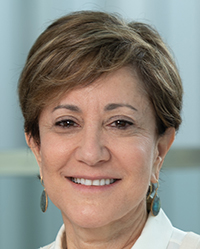
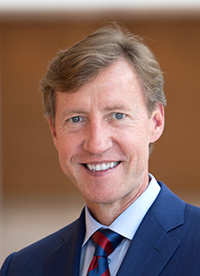 Lessons in organizational change management, team-building and negotiation are on the agenda in a new program designed to fortify leaders in academic medicine and health care for success in an uncertain environment for the field. Penn Medicine and Wharton Executive Education at the Wharton School are joining forces to launch an executive health care leadership program that will offer participants a strategic toolkit to cement their ability to lead at a time when science, technology and economics are reshaping the practice of medicine and altering the field’s economic landscape.
Lessons in organizational change management, team-building and negotiation are on the agenda in a new program designed to fortify leaders in academic medicine and health care for success in an uncertain environment for the field. Penn Medicine and Wharton Executive Education at the Wharton School are joining forces to launch an executive health care leadership program that will offer participants a strategic toolkit to cement their ability to lead at a time when science, technology and economics are reshaping the practice of medicine and altering the field’s economic landscape.
The program, known as Leadership in a New Era of Health Care, is designed for senior-level leaders in health care and academic medicine—doctors, nurses, scientists and executives—from across the world. Beginning with its first four-day course in March 2019, the program will provide participants with targeted leadership development experiences and practical skills to drive visionary change in their organizations.
“A commitment to innovation is at the core of everything we do at Penn Medicine, and we’re dedicated to instilling that same passion for improvement and evolution in our approach to leadership,” said J. Larry Jameson, executive vice president of the University of Pennsylvania for the Health System and dean of Penn’s Perelman School of Medicine. “Health-care leaders today need a broader skill set: They must be strong negotiators, keen students of business and have the emotional intelligence necessary to lead diverse teams who are evolving our approaches to patient-centric care and ensuring that our health systems continue to thrive in an era of some uncertainty for our field.”
Leadership in a New Era of Health Care will be led by faculty from both Wharton and Penn Medicine. Presenters will include deans and CEOs from the nation’s top academic medical centers, chairs of large clinical departments, nursing leaders and senior executives who have built dynamic academic-industry partnerships and overseen transformative new facility projects. Participants will also learn from renowned experts in organizational development and conflict resolution.
“Wharton Executive Education excels at providing a holistic approach to leadership development,” said professor Jagmohan S. Raju, vice dean of Wharton Executive Education. “The US spends more than 18% of its GDP on health care and nearly one in every eight Americans are employed in this sector. Today’s health-care sector requires leaders who are interdisciplinary thinkers with the capability to envision the future, and this program is going to help them do just that.”
Participants will have the opportunity to develop advanced leadership skills through a combination of interactive workshops and dynamic presentations. Areas of focus will include organizational and cultural change, negotiation and conflict resolution, relationship management, coalition-building, communication and strategic decision-making. The program is also designed to support quick-start change management. Through a unique, real-time health-care challenge, participants will get feedback from peers and faculty to help tackle their most pressing on the job issues and be prepared to initiate new plans when they return to their institutions.
“We need to help our health-care leaders stay agile and build their capacity to pivot and respond strategically to changes in the field, from new digital health advances to changes in reimbursement,” said Caryn Lerman, vice dean for Strategic Initiatives in the Perelman School of Medicine and John H. Glick Professor in Cancer Research. “Today’s academic medicine leaders and health-care executives are highly knowledgeable and motivated. We’ve designed this program to leverage those qualities and arm them with the high-impact skills required to drive real change in the organizations they lead.”
The program builds on ideas Dr. Lerman and Dr. Jameson outlined in the New England Journal of Medicine in June 2018, when they called on academic health systems to make leadership development an organizational priority – an emphasis that they say will also pay off in improved patient satisfaction and clinical outcomes.
For more information, visit WhartonPennMedLeadership.com



 Penn Medicine announced the newest Translational Center of Excellence (TCE) in the Abramson Cancer Center, which will be focused on Glioblastoma Multiforme, the most common and lethal form of brain cancer. The team will investigate new immune therapies for glioblastoma and, in particular, design and test new CAR T cell therapies. This involves engineering patients’ T cells (the cells that act on behalf of the immune system) to attack tumor cells. The world’s first gene-based cancer therapy, immunotherapy—or CAR T cell therapy—was pioneered at Penn Medicine, and it became the nation’s first FDA-approved personalized cellular therapy for cancer in August 2017 (
Penn Medicine announced the newest Translational Center of Excellence (TCE) in the Abramson Cancer Center, which will be focused on Glioblastoma Multiforme, the most common and lethal form of brain cancer. The team will investigate new immune therapies for glioblastoma and, in particular, design and test new CAR T cell therapies. This involves engineering patients’ T cells (the cells that act on behalf of the immune system) to attack tumor cells. The world’s first gene-based cancer therapy, immunotherapy—or CAR T cell therapy—was pioneered at Penn Medicine, and it became the nation’s first FDA-approved personalized cellular therapy for cancer in August 2017 (
 Lessons in organizational change management, team-building and negotiation are on the agenda in a new program designed to fortify leaders in academic medicine and health care for success in an uncertain environment for the field. Penn Medicine and Wharton Executive Education at the Wharton School are joining forces to launch an executive health care leadership program that will offer participants a strategic toolkit to cement their ability to lead at a time when science, technology and economics are reshaping the practice of medicine and altering the field’s economic landscape.
Lessons in organizational change management, team-building and negotiation are on the agenda in a new program designed to fortify leaders in academic medicine and health care for success in an uncertain environment for the field. Penn Medicine and Wharton Executive Education at the Wharton School are joining forces to launch an executive health care leadership program that will offer participants a strategic toolkit to cement their ability to lead at a time when science, technology and economics are reshaping the practice of medicine and altering the field’s economic landscape.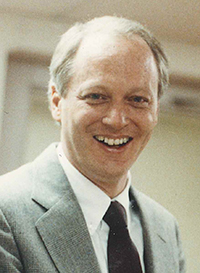 Thomas William Adams, a former director in Penn’s English Language Programs who also taught at GSE, died from cancer on October 21 at his home in New Hope, Pennsylvania. He was 67.
Thomas William Adams, a former director in Penn’s English Language Programs who also taught at GSE, died from cancer on October 21 at his home in New Hope, Pennsylvania. He was 67.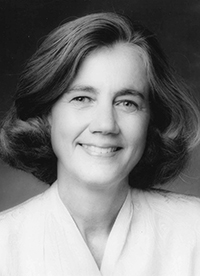 Lucy Judkins Durr Hackney, wife of Penn President Emeritus Sheldon Hackney, died October 26, at her home in Vineyard Haven, Massachussetts, following a prolonged period of declining health. She was 81.
Lucy Judkins Durr Hackney, wife of Penn President Emeritus Sheldon Hackney, died October 26, at her home in Vineyard Haven, Massachussetts, following a prolonged period of declining health. She was 81.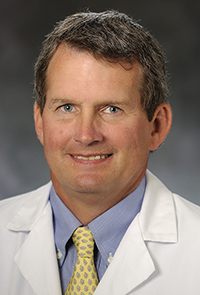 Arthur W. (Drew) Mellen IV, an obstetrician/gynecologist at Pennsylvania Hospital and clinical associate professor at Penn’s Perelman School of Medicine, died October 27 after a 12-year battle with leukemia and myelofibrosis. He was 64.
Arthur W. (Drew) Mellen IV, an obstetrician/gynecologist at Pennsylvania Hospital and clinical associate professor at Penn’s Perelman School of Medicine, died October 27 after a 12-year battle with leukemia and myelofibrosis. He was 64.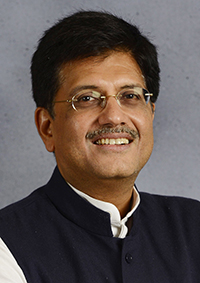 The 2018 Carnot Prize, the highest award presented by the Kleinman Center for Energy Policy at the University of Pennsylvania, was awarded to the Honorable Piyush Goyal, India’s minister of railways and minister of coal, and former minister of power and renewables. The award recognizes distinguished contributions to energy policy.
The 2018 Carnot Prize, the highest award presented by the Kleinman Center for Energy Policy at the University of Pennsylvania, was awarded to the Honorable Piyush Goyal, India’s minister of railways and minister of coal, and former minister of power and renewables. The award recognizes distinguished contributions to energy policy.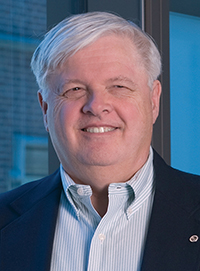 Kenneth Laker, professor in the department of electrical and systems engineering in Penn’s School of Engineering and Applied Science, has been named to the Institute of Electrical and Electronics Engineers (IEEE) Technical Activities Board Hall of Honor.
Kenneth Laker, professor in the department of electrical and systems engineering in Penn’s School of Engineering and Applied Science, has been named to the Institute of Electrical and Electronics Engineers (IEEE) Technical Activities Board Hall of Honor.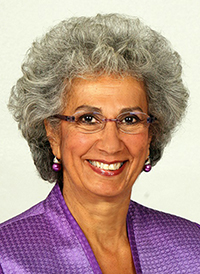 Afaf I. Meleis, professor of nursing and sociology and Penn Nursing dean emerita, has been awarded The Princess Srinagarindra Award, established in commemoration of the Centenary Birthday Anniversary of Her Royal Highness (HRH) Princess Srinagarindra Mahidol, in recognition of her extraordinary contributions to the nursing and midwifery profession, advancing the nursing profession and contributing to the health and wellbeing of people in Thailand and around the world. This award is one of the most prestigious awards in Thailand.
Afaf I. Meleis, professor of nursing and sociology and Penn Nursing dean emerita, has been awarded The Princess Srinagarindra Award, established in commemoration of the Centenary Birthday Anniversary of Her Royal Highness (HRH) Princess Srinagarindra Mahidol, in recognition of her extraordinary contributions to the nursing and midwifery profession, advancing the nursing profession and contributing to the health and wellbeing of people in Thailand and around the world. This award is one of the most prestigious awards in Thailand.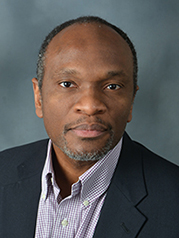 Chinedum Osuji, Eduardo D. Glandt Presidential Professor in Chemical and Biomolecular Engineering at Penn, has been named a fellow of the American Physical Society (APS).
Chinedum Osuji, Eduardo D. Glandt Presidential Professor in Chemical and Biomolecular Engineering at Penn, has been named a fellow of the American Physical Society (APS).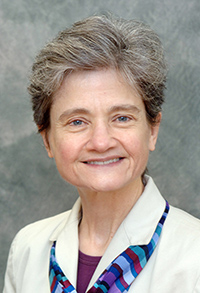 Julie Sochalski, associate professor of nursing, associate dean for academic programs, and Class of 1965 25th Reunion Term Chair at Penn Nursing, has received the 2018 American Association of Colleges of Nursing’s (AACN) Lois Capps Policy Luminary Award. The annual award, created in 2009, recognizes an outstanding nursing leader’s public policy achievements.
Julie Sochalski, associate professor of nursing, associate dean for academic programs, and Class of 1965 25th Reunion Term Chair at Penn Nursing, has received the 2018 American Association of Colleges of Nursing’s (AACN) Lois Capps Policy Luminary Award. The annual award, created in 2009, recognizes an outstanding nursing leader’s public policy achievements. In partnership with the Rare Book Department of the Free Library of Philadelphia, the Schoenberg Institute for Manuscript Studies (SIMS) at the University of Pennsylvania is pleased to announce the 11th Annual Lawrence J. Schoenberg Symposium on Manuscript Studies in the Digital Age.
In partnership with the Rare Book Department of the Free Library of Philadelphia, the Schoenberg Institute for Manuscript Studies (SIMS) at the University of Pennsylvania is pleased to announce the 11th Annual Lawrence J. Schoenberg Symposium on Manuscript Studies in the Digital Age.


